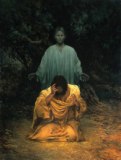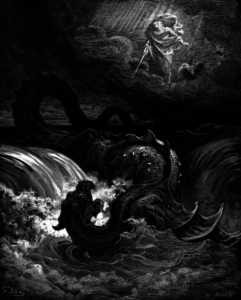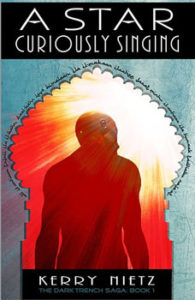Beyond Story Battles 2: Anticipating The After-world
Before Spec-Faithâs actually unplanned tag-team approach to a certain death-and/or-frivolity-obsessed controversial holiday, Iâd broached a problem that seems common to many kinds of Christians â including fans of visionary stories.
Itâs this: a lot of us seem to be living to Fight the Problem. We like a protest movement. Walking around with signs, figuratively or literally. Picking apart the annoying religious cultural âfundamentalistâ types who either despise fiction, or else prefer only the âsafeâ little stories that ignore the reality of sin, the horrors of our world, or the Gospel itself.
In no way do I say these fights are bad. That would first be more of the same problem; it would also be hypocritical. This week, while looking up data for books in our SF Library, I did it again myself. I saw a review of a Christian fantasy book. It finished with this:
These books are truly good books for children. They present good morals, beliefs, values, and everything else healthy for children. With these books, you do not have to worry about what your child is reading – a rare occurrence in our world today!
Grrr. Argh. Nnnghh. Eeesh!
Thatâsnottheonlyreasonwereadgreatnovelswhyactlikeweareonlyallowedtoreadâsafeâbooks
doyouhaveanyideahowthismakesweChristianslooktoTheWorld? (Pant, pant, pant âŠ)
 If I kept going with that reaction, Iâd be doing the same thing: basing most, or even all, of my reasons for loving and supporting Christian visionary fiction on an anti. Instead of âI donât want objectionable âworldlyâ stuff in my fictionâ (or more likely childrenâs fiction), my reason would be, âI donât want objectionable âsafeâ stuff in my fiction.â Only one term has changed. The main reason is still Anti-ism. Thatâs not sustainable, and not Biblical.
If I kept going with that reaction, Iâd be doing the same thing: basing most, or even all, of my reasons for loving and supporting Christian visionary fiction on an anti. Instead of âI donât want objectionable âworldlyâ stuff in my fictionâ (or more likely childrenâs fiction), my reason would be, âI donât want objectionable âsafeâ stuff in my fiction.â Only one term has changed. The main reason is still Anti-ism. Thatâs not sustainable, and not Biblical.
Absolutely we find times to obey wartime instincts and fight bad guys or bad ideas. But Iâd guess we have seen the results when folks confuse those means for the end. Honest Christians â especially those with backgrounds in apologetics and doctrine-debating â would admit they daily fight the drive to do only war-waging and mutate into jerks.
Thereâs a time for battling. A time for saying Christian fiction has room to grow out of its synthetic âsafeness.â And thereâs a time to push back the other way, rightfully objecting to overcorrections to the first problem in favor of another: rolling in âgrittyâ garbage.
But for the Christian, especially one open to wonderful, epic storytelling, there is also âŠ
 a time to kill, and a time to heal;
a time to break down, and a time to build up;[âŠ] a time to love, and a time to hate;
a time for war, and a time for peace.Ecclesiastes 3: 3, 8
Last time was my time to declare war on constant war-declaring. Now for the peace.
Echoes in Old Earth
It wasnât C.S. Lewis who coined the term joy or defined it as that sense of a Something Else, an awareness of awe and anticipation, that draws one to God. But it was likely Lewis who re-popularized this idea, made it more legitimate even for book-oriented Christians. If for no other reason, Lewis showed in his balance â fiction and nonfiction, apologetics and pure-fun âfairyâ tales â that one can be a serious Christian, yet also go past the study, actually applying it, and go outside the library and into the world to be surrounded by very physical, beautiful things like sunshine ⊠warm breezes ⊠beauties.
Because all the truths about God we study, all the battles we fight, all the excesses of Christian siblings or villainies of nonbelievers, have a purpose beyond. Lewis knew that, and fleshed it out in his descriptions of âlooking atâ a beam of light â to contemplate it â versus âlooking alongâ the same beam to experience it, to be illuminated, with joy.
Great stories do that. They awaken in us that emotion, but not an emotion as an end to itself or to more emotion, but based on truth â Godâs truth, even if we donât know it.
Even stories that donât specifically include mentions of God or Christianity can awaken that feeling. Do you remember all the news stories in December 2009 to early 2010 about the number of Avatar fans (the CG blue-people movie) who were depressed because the fantastic world of Pandora only existed in special-effects render-farms, film projectors, and their own imaginations? They yearned for that elusive beauty that only exists in art and nature in this world. And suddenly it was a bit more cool to do that â even if some observers laughed at those movie fans.
I didnât laugh. I did wish theyâd take that feeling and use it to seek God, and that God would be drawing them to Himself: the only sure source of ultimate truth and beauty.
Yet I also recalled my own hints of that wonder.
 Itâs the same reason I donât stay locked up inside doing web-design or writing, but make myself walk to my office most days. Itâs why even now Iâm tempted to go outside and simply exult in the glories of brilliantly falling leaves, on this perfect warm autumn day that God has given to me and to everyone, saint and sinner alike (Matt. 5:45).
Itâs the same reason I donât stay locked up inside doing web-design or writing, but make myself walk to my office most days. Itâs why even now Iâm tempted to go outside and simply exult in the glories of brilliantly falling leaves, on this perfect warm autumn day that God has given to me and to everyone, saint and sinner alike (Matt. 5:45).
Itâs why I play the same epic-sounding film soundtrack clips over and over.
Itâs why I re-listen to the Lord of the Rings film score as I do this time every year.
Itâs also why I long for the Christmas season again, with all its lights and gifts and candles and music ⊠oh, the music ⊠as much like a child as I can.
This reason, also, leads me to seek out great stories. I want not just to find new ways of being entertained, or studying truth in more-potent or âsimulatedâ story-worlds. Stories are a special means to God Himself. They arouse in careful readers, who are humble enough to let themselves be carried like children, that feeling of Otherness.
Sometimes a storyâs Other is only a blurred Something: a world, culture, hero, or a community of family and friends. Even these things can vaguely image God.
But for Christians, the reflections can be even sharper. Great stories, or music, or any other art, can bring forth emotional response, a religious affection as Jonathan Edwards would call it, that is based in beauty and truth, and drive us more to their Source: God.
Like Edwards, I am a âChristian Hedonist.â That requires clarification. I donât at all mean pagan hedonism. It was the modern Christian author/pastor John Piper who coined that term, in Desiring God. By it Piper meant the Biblical doctrine of seeking joy in God as our reward, and doing all things accordingly. And this is not truly selfishness, because that reward should be God Himself, for whom all people are created to enjoy Him forever.
But even Piper, at times, can seem limited about the applications of Christian Hedonism. Heâll more often preach or write about more-âspiritualâ approaches to seeking Godâs pleasures, such as being willing to face persecution, suffer, or sacrifice comfortable lifestyles. All these are very important actions, and things God might require of us. Yet His wonders and our resultant joy in Him are revealed not only in the Bible (though this is His only sure Word!), faithful church- and Kingdom-involvement, sacrifice, or sacraments. They are revealed in any emotion thatâs grounded in His revealed beauty and truth, that gives us delight in Him â even on this Old Earth.
Expecting New Earth

Great stories also point us to more than just reflections of Godâs truth and beauty in this old Earth.
I think sometimes Christians forget that we donât need to paint the values of art and storytelling in faint, pastel colors. If we choose, we can be bold. Overt. Even Earthy â because Scripture promises us not only vague happiness with God in eternity, but actual time, in space, with new bodies in a physical world: this one, remade, for everlasting life.
[A]ccording to [Godâs] promise we are waiting for new heavens and a new earth in which righteousness dwells.
2 Peter 2:13
Itâs to that After-world that all great visionary stories point, more than any other genre.
There all believersâ joy in Christ will be complete. There all the stories will come true, happy ending upon happy ending. We will find the source of the music. The Substance behind all the beautiful reflections. And all battles will be over. I doubt weâll miss them.
Will we continue to have stories, though? Actual stories, fiction, in that everlasting realm? Thatâs another topic for another time, perhaps even next week.
But now: for which of these reasons do you love Christian visionary fiction? Partly as an anti â a reaction against âsafeâ nonsense or overly âspiritualâ expectations? Or on your best days, do you love a great story to âgetâ more of our far-greater God, to enjoy Him now, and to anticipate the everlasting eras when at last we will enjoy Him completely?
Alas. For me, itâs a mixture. Thank God Heâs still changing us, as characters in His Story!























































 In Acts, though, we read only brief mentions of Christians casting out demons; the Apostle Paulâs case is the most specific (Acts 16: 16-18). But whatâs very strange there is that he seems not to have followed some Christian âdeliverance ministryâ-style routines on the subject. Paul put up with the demon-influenced girlâs ranting âfor many days,â until finally commanding the demon, in Jesusâ Name, to get the Hell out of there.
In Acts, though, we read only brief mentions of Christians casting out demons; the Apostle Paulâs case is the most specific (Acts 16: 16-18). But whatâs very strange there is that he seems not to have followed some Christian âdeliverance ministryâ-style routines on the subject. Paul put up with the demon-influenced girlâs ranting âfor many days,â until finally commanding the demon, in Jesusâ Name, to get the Hell out of there. Iâm also perplexed that Christians evidently believe the Devil is so stupid as to make his worst works so obviously revealed by wicked-looking decorations or covens routinely sacrificing goats in the woods. At some point, it seems, Satan gave up the whole âangel of lightâ routine (2 Cor. 11:14)? Instead demons are honest foes, standing proud in their redcoats (with optional pitchfork and forked-tail accessories), firing at Christians?
Iâm also perplexed that Christians evidently believe the Devil is so stupid as to make his worst works so obviously revealed by wicked-looking decorations or covens routinely sacrificing goats in the woods. At some point, it seems, Satan gave up the whole âangel of lightâ routine (2 Cor. 11:14)? Instead demons are honest foes, standing proud in their redcoats (with optional pitchfork and forked-tail accessories), firing at Christians?










